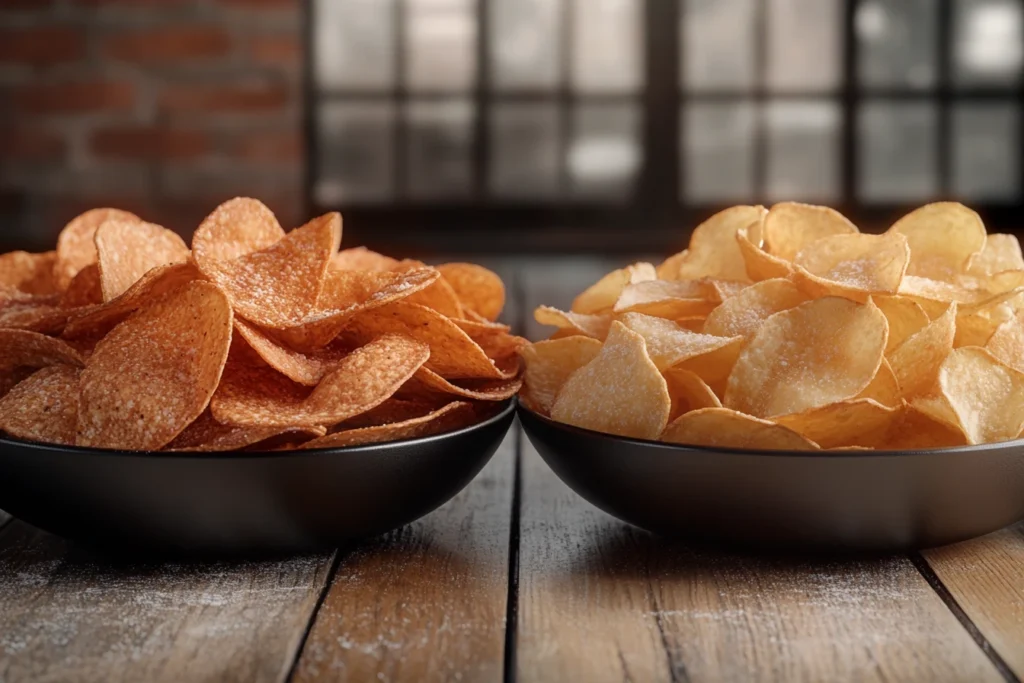1. Introduction to Protein Chips
Protein chips have revolutionized the snack industry, offering a healthier alternative to traditional potato chips. Packed with protein, these snacks cater to individuals who prioritize nutrition without compromising flavor or texture.
With the rising popularity of fitness and health-conscious diets, They have become a go-to snack for gym-goers, weight watchers, and anyone seeking a satisfying, high-protein treat. They are specifically formulated to provide the benefits of protein while maintaining the crunch and taste associated with classic ones.
This article delves into the essentials of protein chips, including their nutritional benefits, variations, recipes, and top brands. Whether you’re looking to enhance your diet or explore healthier snack options, this guide provides all the information needed to make an informed choice.
2. What Are Protein Chips?
Protein chips are a modern snack designed to combine great taste with high nutritional value. Unlike traditional potato chips, which are often high in carbohydrates and fats, They are formulated to deliver a significant amount of protein per serving while keeping calories and carbs lower.
2.1 Definition and Composition
They are made using protein-rich ingredients such as whey protein isolate, soy protein, and pea protein. These components are blended with binding agents, seasonings, and flavor enhancers to create a crispy, chip-like texture.
Unlike regular chips that rely on potatoes or corn as the primary ingredient, protein chips focus on protein sources, making them more suitable for fitness enthusiasts and those following specific diets like keto or high-protein meal plans.
The process often involves baking or air-frying rather than deep-frying, which further reduces fat content without compromising on crunch. This preparation method aligns with health-conscious dietary preferences.
2.2 How They Differ from Regular Chips

Protein chips differ from regular chips in several ways, starting with their nutritional profile. While traditional chips are primarily composed of starches and fats, protein chips focus on providing macronutrients like protein and fiber, with fewer carbohydrates.
A single serving of them typically offers 10 to 20 grams of protein, compared to less than 2 grams in regular potato chips. Additionally, they often contain fewer calories, around 130–150 per serving, whereas standard potato chips average 160–200 calories per serving.
In terms of ingredients, they replace starchy potatoes with protein isolates or plant-based proteins, offering a gluten-free and low-carb alternative. Their flavor profiles also range widely, mimicking classic options such as barbecue and sour cream while incorporating healthier formulations.
3. Nutritional Benefits of Protein Chips
Protein-based snacks have gained popularity due to their ability to combine flavor and nutrition in a single bite. These chips are formulated to provide essential nutrients, making them a healthier alternative to conventional snacks.
3.1 High Protein Content
One of the main advantages of these snacks is their protein-rich profile. Most servings contain between 10 and 20 grams of protein, which helps support muscle growth, repair, and recovery. For individuals who follow fitness routines or strength training programs, protein-rich snacks can make it easier to meet daily protein goals.
Protein also promotes satiety, which means consuming these chips can help reduce hunger and curb cravings. This makes them a great option for those aiming to manage weight without sacrificing flavor.
3.2 Low in Carbohydrates and Calories
Compared to traditional options, protein-based chips generally have fewer carbohydrates and calories. They are often suitable for low-carb diets such as keto or paleo plans.
For example, a typical serving may contain 130–150 calories and just 3–5 grams of carbohydrates. This is significantly lower than regular potato chips, which can have 160–200 calories and over 15 grams of carbs per serving.
These snacks provide guilt-free indulgence while keeping macronutrient ratios balanced, making them an ideal choice for those focusing on portion control and healthier eating habits.
3.3 Added Vitamins and Minerals
Many varieties are fortified with essential vitamins and minerals, such as calcium, iron, and magnesium. These additions contribute to improved bone health, energy metabolism, and immune function.
Plant-based options often include fiber, which aids digestion and promotes gut health. The added nutritional value makes these snacks more than just a treat—they become part of a well-rounded diet.
4. Types of Protein Chips Available
Protein-enriched chips come in a variety of options, catering to different dietary needs and preferences. Whether made from animal-based proteins or plant-based sources, these snacks provide flexibility for consumers with varying nutritional goals.
4.1 Animal-Based Protein Chips
Animal-based options often use whey protein isolate or casein protein as their primary ingredient. These chips are especially popular among athletes and bodybuilders due to their high protein concentration. To explore more high-protein snack options, check out Verywell Fit – Best High-Protein Snacks for additional recommendations.
Whey protein is a complete source of amino acids, which aids in muscle recovery and growth. Additionally, casein provides slow-digesting protein, making these snacks ideal for sustained energy release.
Popular flavors in this category include barbecue, sour cream and onion, and cheddar. They are often marketed toward fitness enthusiasts looking for convenient post-workout snacks.
4.2 Plant-Based Protein Chips
For vegetarians and vegans, plant-based varieties offer a protein-rich alternative without relying on animal products. These chips are typically made with ingredients such as pea protein, lentils, quinoa, and chickpeas.
Plant-based options are often higher in fiber, making them beneficial for digestion. They also appeal to environmentally conscious consumers looking for sustainable snack options.
Common flavors include spicy chili, herb and garlic, and roasted vegetables, providing diverse taste profiles while maintaining nutritional value.
4.3 Keto-Friendly Protein Chips
Keto-friendly versions focus on low-carb content, making them suitable for those following ketogenic diets. These snacks often incorporate ingredients like almond flour, egg whites, and cheese powder to maintain flavor while minimizing carbs.
With as little as 2–4 grams of carbohydrates per serving, keto-friendly options provide a satisfying crunch without disrupting ketosis. Popular flavors include jalapeño cheddar, smoky bacon, and garlic parmesan.
4.4 Gluten-Free and Allergy-Friendly Varieties
Many protein-based chips are designed to be gluten-free, catering to individuals with gluten sensitivities or celiac disease. Additionally, allergy-friendly versions exclude soy, nuts, and dairy to accommodate specific dietary restrictions.
These options ensure that everyone, regardless of dietary limitations, can enjoy a flavorful and crunchy snack.
5. How to Make Homemade Protein Chips
Making protein-enriched chips at home is a simple and rewarding process. Homemade versions allow you to control the ingredients, flavors, and nutritional content while avoiding preservatives commonly found in store-bought options.
5.1 Basic Recipe for Protein Chips

Ingredients:
- 1 cup almond flour or oat flour
- 1/2 cup protein powder (whey or plant-based)
- 1 teaspoon garlic powder
- 1 teaspoon paprika
- 1/2 teaspoon salt
- 1/4 teaspoon black pepper
- 1/4 cup water
- 1 egg white (for binding)
Instructions:
- Preheat the oven to 350°F (175°C).
- Mix all dry ingredients in a bowl until well combined.
- Add the egg white and water, stirring until the dough forms. If the dough is too dry, add more water one teaspoon at a time.
- Roll the dough between two sheets of parchment paper until thin and even.
- Cut the dough into triangular shapes using a knife or pizza cutter.
- Transfer the pieces to a lined baking sheet and bake for 12–15 minutes or until golden brown and crispy.
- Allow the chips to cool before serving.
5.2 Flavor Variations
Cheesy Protein Chips:
- Add 1/2 cup grated Parmesan or cheddar cheese to the dough for extra flavor.
- Sprinkle cheese on top before baking for a golden crust.
Spicy Chili Chips:
- Mix in 1 teaspoon chili powder and a pinch of cayenne pepper for heat.
- Garnish with red pepper flakes for added spice.
Herb and Garlic Chips:
- Add 1 teaspoon of Italian seasoning and 1/2 teaspoon garlic powder to the mix.
- Top with fresh parsley after baking for a fragrant finish.
5.3 Storage and Shelf Life
Homemade protein-based chips can be stored in an airtight container at room temperature for up to 5 days. For longer storage, place them in the refrigerator for up to two weeks. To keep them crispy, reheat in the oven for a few minutes before serving. For more healthy snack ideas, check out Cottage Cheese Recipes – Healthy Meal Ideas that are perfect for nutritious meal planning.
6. Best Brands of Protein Chips
They are widely available in stores and online, with several brands offering a variety of flavors and nutritional profiles. Here’s a look at some of the most popular options.
6.1 Quest Nutrition Protein Chips
Quest Nutrition is one of the most recognized brands in the health and fitness industry. Their chips are known for high protein content and low carb count, making them ideal for keto and low-carb diets.
Nutritional Highlights:
- Protein: 18–21 grams per serving
- Carbohydrates: 3–4 grams net carbs
- Calories: 130–150 per serving
Popular Flavors:
- BBQ
- Sour Cream & Onion
- Loaded Taco
Quest chips are baked, not fried, ensuring a crispy texture without excess fats. They are commonly used as post-workout snacks or meal replacements due to their high protein levels. For more comforting and high-protein dishes, try pairing your snacks with this Smoked Mac and Cheese Recipe for a delicious meal option.
6.2 PopCorners Flex Protein Chips
PopCorners offers protein-rich chips made from plant-based ingredients. These are ideal for vegetarians and those following gluten-free diets.
Nutritional Highlights:
- Protein: 10 grams per serving
- Carbohydrates: 14–16 grams
- Calories: 120–140 per serving
Popular Flavors:
- Buffalo
- Barbecue
- Sea Salt
PopCorners Flex chips are air-popped, providing a light, crunchy texture. Their plant-based protein sources make them suitable for vegan and vegetarian diets.
6.3 IWON Organics Protein Chips
IWON Organics focuses on organic, non-GMO ingredients to create healthier snacks. Their protein chips are packed with plant-based protein, fiber, and healthy fats.
Nutritional Highlights:
- Protein: 10–12 grams per serving
- Carbohydrates: 15–18 grams
- Calories: 140–160 per serving
Popular Flavors:
- Sweet Dijon
- Caramelized Onion
- Mesquite BBQ
IWON Organics offers a gluten-free, soy-free, and non-GMO option, making them a top choice for those with dietary restrictions.
6.4 LesserEvil Egg White Curls
LesserEvil provides a unique take on protein-based snacks by incorporating egg whites for protein. These snacks are keto-friendly and rich in essential amino acids.
Nutritional Highlights:
- Protein: 6–8 grams per serving
- Carbohydrates: 1–2 grams net carbs
- Calories: 100–120 per serving
Popular Flavors:
- Himalayan Pink Salt
- Egg & Cheddar
7. Frequently Asked Questions (FAQs) About Protein Chips
7.1 Are Protein Chips Healthy?
Yes, they are considered healthier than traditional potato chips due to their higher protein content and lower carbohydrate and fat levels. They also promote satiety, which can help reduce overeating. However, it’s important to check labels for added preservatives or artificial ingredients.
7.2 Can I Eat Protein Chips Every Day?
They can be part of a balanced diet if consumed in moderation. They work well as snacks between meals or post-workout treats. Be mindful of sodium levels, especially if you’re consuming them regularly.
7.3 Are Protein Chips Good for Weight Loss?
They can support weight loss efforts because they are high in protein, which helps keep you full for longer periods. When paired with portion control and a healthy diet, they can prevent unhealthy snacking and cravings.
7.4 Are Protein Chips Suitable for Keto Diets?
Many varieties are keto-friendly, especially those with low-carb and high-fat profiles. Always check labels to ensure the carb count fits within your macros for ketosis.
7.5 Do Protein Chips Taste Like Regular Chips?
They are designed to replicate the crunch and flavor of regular chips while offering added nutritional benefits. While the texture may differ slightly, they come in a variety of flavors that closely mimic traditional snack options.
7.6 Are Protein Chips Gluten-Free?
Several brands offer gluten-free varieties, but it’s essential to check the packaging for certifications, particularly if you have gluten sensitivities or allergies.
8. Conclusion
Protein chips have emerged as a convenient and nutritious alternative to traditional snack options. They combine flavor, crunch, and health benefits, making them ideal for fitness enthusiasts, dieters, and anyone seeking healthier snacks.
With options ranging from whey-based to plant-based and keto-friendly varieties, protein-packed chips cater to diverse dietary needs and preferences. Homemade recipes further expand the possibilities, offering flexibility for those who enjoy experimenting in the kitchen.
Whether you’re looking for a post-workout snack, a low-carb treat, or simply a guilt-free indulgence, these chips provide a satisfying solution. Their growing popularity highlights the shift toward healthier eating habits without compromising taste.
